Deck 21: Amines and Their Derivatives: Functional Groups Containing Nitrogen
Question
Question
Question
Question
Question
Question
Question
Question
Question
Question
Question
Question
Question
Question
Question
Question
Question
Question
Question
Question

Unlock Deck
Sign up to unlock the cards in this deck!
Unlock Deck
Unlock Deck
1/20
Play
Full screen (f)
Deck 21: Amines and Their Derivatives: Functional Groups Containing Nitrogen
1
Rank the following in order of decreasing basicity (most basic on left): 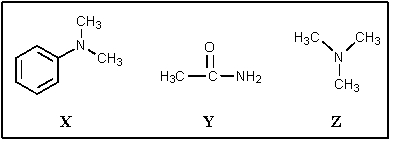
A) Z > X > Y
B) Y > X > Z
C) Z > Y > X
D) X > Z > Y
E) X > Y > Z

A) Z > X > Y
B) Y > X > Z
C) Z > Y > X
D) X > Z > Y
E) X > Y > Z
Z > X > Y
2
Which of the following represents N-ethyl-2-phenylethylamine?
A)

B)

C)

D)

E)

A)

B)

C)

D)

E)


3
Absorptions at 3358 cm-1 and 3283 cm-1 in the IR spectrum would suggest which of the following compounds?
A)
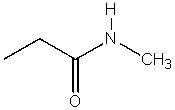
B)

C)

D)

E) cannot tell from the absorption data
A)

B)

C)

D)

E) cannot tell from the absorption data

4
Which of the molecules below is the strongest base?
A)

B)

C)

D)

E)

A)

B)

C)

D)

E)


Unlock Deck
Unlock for access to all 20 flashcards in this deck.
Unlock Deck
k this deck
5
What is the result of the reaction shown? 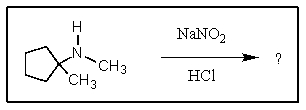
A)

B)

C)

D)

E)


A)

B)

C)

D)

E)


Unlock Deck
Unlock for access to all 20 flashcards in this deck.
Unlock Deck
k this deck
6
Which of the following reactions can be used to prepare ethylamine?
A)

B)

C)
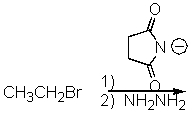
D)

E) All of the above.
A)

B)

C)

D)

E) All of the above.

Unlock Deck
Unlock for access to all 20 flashcards in this deck.
Unlock Deck
k this deck
7
What is the structure of lithium diisopropylamide (LDA)?
A)

B)

C)

D)

E)

A)

B)

C)

D)

E)


Unlock Deck
Unlock for access to all 20 flashcards in this deck.
Unlock Deck
k this deck
8
What product would result from the following reaction? 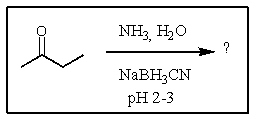
A)

B)

C)

D)

E)


A)

B)

C)

D)

E)


Unlock Deck
Unlock for access to all 20 flashcards in this deck.
Unlock Deck
k this deck
9
Which of the following sets of reagents would accomplish the reaction shown below? 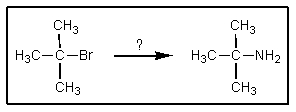
A)

B)

C)

D)
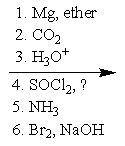
E)
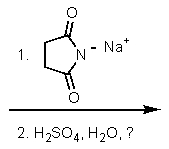

A)

B)

C)

D)

E)


Unlock Deck
Unlock for access to all 20 flashcards in this deck.
Unlock Deck
k this deck
10
What would be formed in the following reaction? 
A) CH3NH2
B) (CH3)2NH
C) (CH3)3N
D) None of these.
E) All of these.

A) CH3NH2
B) (CH3)2NH
C) (CH3)3N
D) None of these.
E) All of these.

Unlock Deck
Unlock for access to all 20 flashcards in this deck.
Unlock Deck
k this deck
11
Which of the following is not formed as either an intermediate along the reaction pathway or as a final product for the Mannich reaction shown below? 
A)

B)

C)

D)
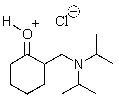
E)


A)

B)

C)

D)

E)


Unlock Deck
Unlock for access to all 20 flashcards in this deck.
Unlock Deck
k this deck
12
Which of the following is not limited to the synthesis of primary amines (R-NH2 or Ar-NH2)(i.e.,which,if any,can be used to make 2° or 3° amines)?
A) Gabriel synthesis
B) Reduction of amides with LAH
C) Hofmann rearrangement
D) Reduction of nitriles with LAH
E) Reduction of nitro groups with Fe/HCl
A) Gabriel synthesis
B) Reduction of amides with LAH
C) Hofmann rearrangement
D) Reduction of nitriles with LAH
E) Reduction of nitro groups with Fe/HCl

Unlock Deck
Unlock for access to all 20 flashcards in this deck.
Unlock Deck
k this deck
13
What product would result from the Hofmann elimination of the following quaternary ammonium hydroxide? 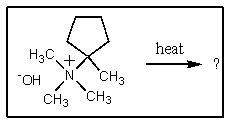
A)

B)

C)

D)

E)


A)

B)

C)

D)

E)


Unlock Deck
Unlock for access to all 20 flashcards in this deck.
Unlock Deck
k this deck
14
Predict the major organic product of the following reaction. 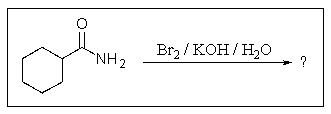
A)

B)

C)
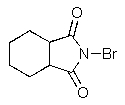
D)

E)


A)

B)

C)

D)

E)


Unlock Deck
Unlock for access to all 20 flashcards in this deck.
Unlock Deck
k this deck
15
Which of the following products would you expect to result from the following reactions? 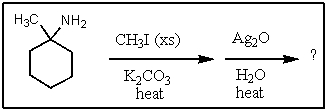
A)

B)

C)

D)

E)


A)

B)

C)

D)

E)


Unlock Deck
Unlock for access to all 20 flashcards in this deck.
Unlock Deck
k this deck
16
Which of the following structures is a secondary amine?
A)

B)
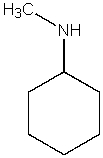
C)
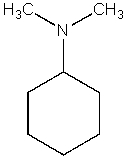
D)

E)

A)

B)

C)

D)

E)


Unlock Deck
Unlock for access to all 20 flashcards in this deck.
Unlock Deck
k this deck
17
What by-product(s)would you expect to contaminate methyl amine prepared by the following reaction? 
A) (CH3)2NH
B) (CH3)3N
C) (CH3)4N+ I-
D) All of the above.
E) None of the above.

A) (CH3)2NH
B) (CH3)3N
C) (CH3)4N+ I-
D) All of the above.
E) None of the above.

Unlock Deck
Unlock for access to all 20 flashcards in this deck.
Unlock Deck
k this deck
18
N-nitrosoamines (called nitrosamines)have what outstanding characteristic?
A) An intense fishy odor
B) Tend to be carcinogenic
C) Ammonia-like odor
D) Easily rearrange
E) Have acidic N-H hydrogens
A) An intense fishy odor
B) Tend to be carcinogenic
C) Ammonia-like odor
D) Easily rearrange
E) Have acidic N-H hydrogens

Unlock Deck
Unlock for access to all 20 flashcards in this deck.
Unlock Deck
k this deck
19
What major product would you expect from the reaction shown? 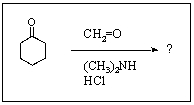
A)

B)

C)

D)

E)


A)

B)

C)

D)

E)


Unlock Deck
Unlock for access to all 20 flashcards in this deck.
Unlock Deck
k this deck
20
What process accomplishes the following transformation? 
A) Gabriel synthesis
B) Hofmann rearrangement
C) Reductive amination
D) Mannich reaction
E) Hofmann elimination

A) Gabriel synthesis
B) Hofmann rearrangement
C) Reductive amination
D) Mannich reaction
E) Hofmann elimination

Unlock Deck
Unlock for access to all 20 flashcards in this deck.
Unlock Deck
k this deck



